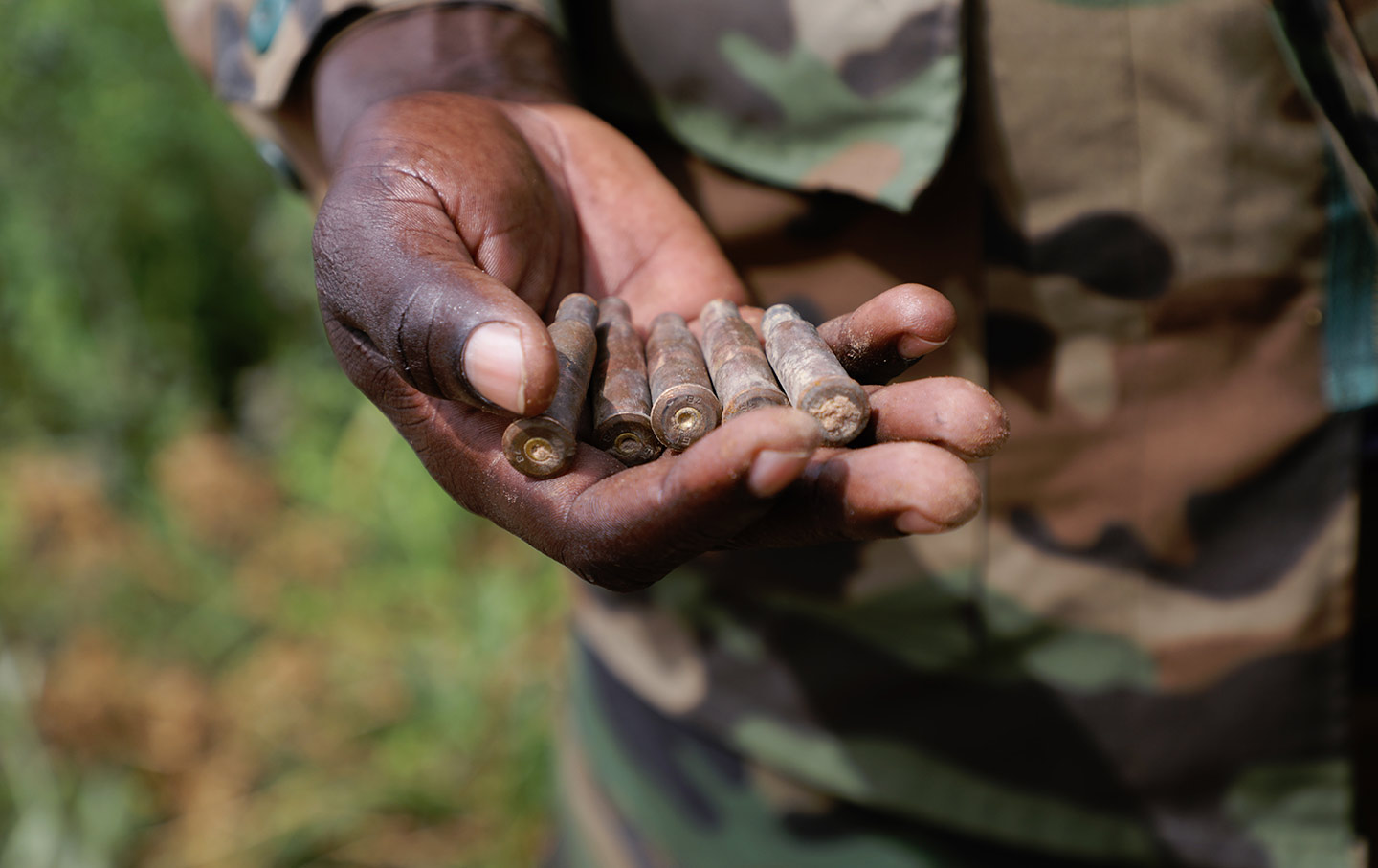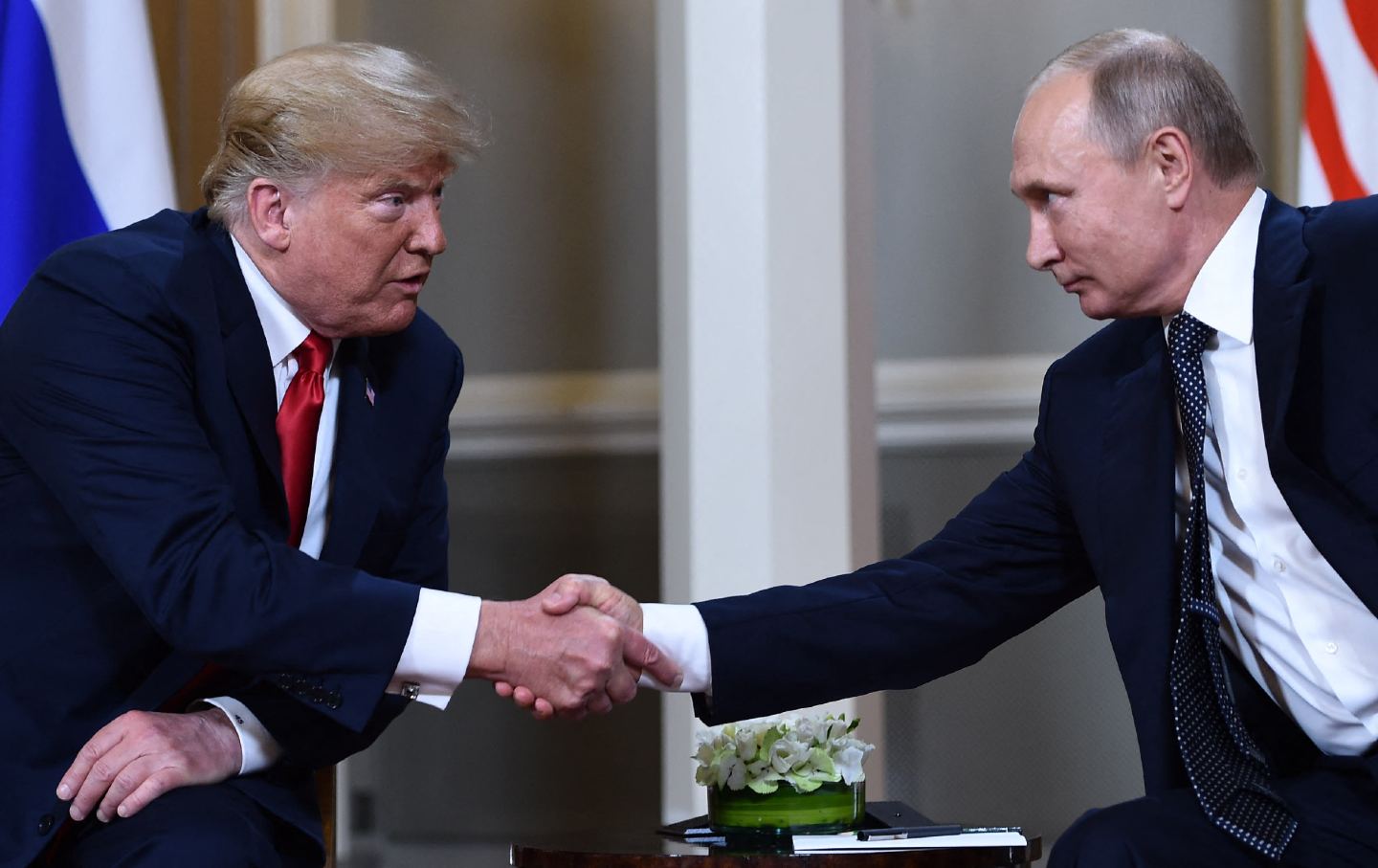The War in Sudan Is Causing Mass Starvation
If we don’t start paying a lot more attention to it soon—as in right now—it’s going to be too late.

Brig. Gen. Moses Lokujo holds bullet casings fired during a battle between government and opposition forces in Logo in October 2017.
(Simona Foltyn)
This article originally appeared at TomDispatch.com. To stay on top of important articles like these, sign up to receive the latest updates from TomDispatch.com.
For months, we’ve all been able to stay reasonably informed about the wars in Gaza and Ukraine. But there’s another horrific war that’s gotten so little coverage you could be excused for not knowing anything about it. What we have in mind is the seemingly never-ending, utterly devastating war in Sudan. Think of it as the missing war. And if we don’t start paying a lot more attention to it soon—as in right now—it’s going to be too late.
After 15 months of fighting in that country between the Sudanese Armed Forces (SAF) and the paramilitary Rapid Support Forces (RSF), experts in food insecurity estimate that almost 26 million people (no, that is not a misprint!), or more than half of Sudan’s population, could suffer from malnutrition by September. Eight and a half million of those human beings could face acute malnutrition. Worse yet, if the war continues on its present path, millions will die of hunger and disease in just the coming months (and few people in our world may even notice).
By now, those warring armies have driven Sudan to the brink of all-out famine, partly by displacing more than a fifth of the population from their homes, livelihoods, and farms, while preventing the delivery of food to the places most in need. And you undoubtedly won’t be surprised to learn that, with their foreign-policy eyes focused on Gaza and Ukraine, our country’s government and others around the world have paid remarkably little attention to the growing crisis in Sudan, making at best only half-hearted (quarter-hearted?) gestures toward helping negotiate a ceasefire between the SAF and RSF, while contributing only a small fraction of the aid Sudan needs to head off a famine of historic magnitude.
From Emergency to Catastrophe
In late June, the UN-backed Integrated Food Security Phase Classification (IPC) system, which monitors regions at risk of starvation, reported “a stark and rapid deterioration of the food security situation” in Sudan. It noted that the number of people suffering hunger severe enough to qualify, in IPC terms, as Phase 3 (“Crisis”) or Phase 4 (“Emergency”) has ballooned 45 percent since the end of last year. In December 2023, no Sudanese had yet made it to Phase 5 (“Catastrophe”), a condition characteristic of famines. Now, more than three-quarters of a million people are in that final phase of starving to death. Indeed, if the conflict continues to escalate, large parts of Sudan may spiral into full-blown famine, a state that exists, according to the IPC, when at least 20 percent of an area’s population is suffering Phase-5 hunger.
Until recently, the worst conflict and hunger were concentrated in western Sudan and around Khartoum, the country’s capital. Now, however, they’ve spread to the east and south as well. Worse yet, the war in Sudan has by now displaced an astounding 10 million people from their homes, more than four million of them children—a figure that looks like but isn’t a misprint. Many have had to move multiple times and two million Sudanese have taken refuge in neighboring countries. Worse yet, with so many people forced off their land and away from their workplaces, the capacity of farmers to till the soil and other kinds of workers to hold down a paycheck and so buy food for their families has been severely disrupted.
Not surprisingly, 15 months of brutal war have played havoc with crop production. Cereal grain harvests in 2023 were far smaller than in previous years and stocks of grain (which typically supply 80 percent of Sudanese caloric intake) have already been fully consumed, with months to go before the next harvest, a stretch of time known, even in good years, as the “lean season.” And with war raging, anything but a bumper crop is expected this year. Indeed, just as planting season got underway, fierce fighting spilled over into wheat-growing Gezira, one of Sudan’s 18 “states” and renowned as the nation’s breadbasket.
Sudan desperately needs food aid and it’s simply not getting enough. The UN High Commission for Refugees has received less than 20 percent of the funds necessary to help feed the Sudanese this year and has had to “drastically cut” food rations. As Tjada D’Oyen McKenna, head of the aid nonprofit Mercy Corps, told the New York Times, “World leaders continue to go through the motions, expressing concern over Sudan’s crisis. Yet they’ve failed to rise to the occasion.”
Worse yet, in the swirling chaos, even the food aid that does make it to Sudan is largely failing to reach starving populations in anything approaching adequate quantities—and when available, it’s usually unaffordable. Famished people are reportedly boiling leaves, as well as eating grass, peanut shells, and even dirt.
Starvation: “A Cheap and Very Effective Weapon”
For many families, the one thing keeping starvation at bay may be a local free soup kitchen. In a report published in May, Timmo Gaasbeek of the Netherlands Institute of International Relations noted, “Sudan has a long tradition of sharing food. After the war broke out and hunger spread, community-level initiatives for sharing food sprang up across the country. These ‘soup kitchen’ initiatives are often informal but can be very well organized.”
Gaasbeek warned, however, that soup kitchens can fill only so many gaping holes in a system shattered by wartime destruction, displacement, and crop failure. His institute estimates that at current rates of food sharing, 2.5 million people could die of hunger and disease by the time crops are harvested in September. In other words, a shocking 10–20 percent of the Sudanese in the hardest-hit areas could die—mortality rates similar to ones suffered during horrendous famines in parts of Nigeria in 1969, Ethiopia in 1984, and Somalia in 1992.
By Gaasbeek’s calculations, more aggressive food sharing through soup kitchens and other means could cut the total death toll to a still-appalling one million. But that seems unlikely since even the existing efforts by local mutual-aid groups and international organizations to provide food have come under attack from both sides in the war. Six international experts writing for the UN Office of the High Commissioner for Human Rights have accused SAF and RSF of “using food as a weapon and starving civilians.” They also found that the “deliberate targeting of humanitarian workers and local volunteers has undermined aid operations, putting millions of people at further risk of starvation.”
We recently got in touch with Hadeel Mohamed, an educator with whom we’d spoken last October after she fled Sudan for Egypt. In a July 16 e-mail to us, she wrote that “the war in Sudan, like many wars, has proved to be more an attack on civilians than on any armed forces.” Still in contact with neighbors who stayed behind in Khartoum, she reports that neither army is protecting civilians. In fact, the two at times appear to be tag-teaming to do them in. When, for instance, RSF forces carry out a raid, her contacts tell her, SAF troops are often “removed from the locations hours before the attacks occur.” Worse yet, for those now trying to flee as she did last year, “Some said that, in their attempts to escape Khartoum, they’ve encountered RSF forces waiting to loot them. All their supplies were stolen once again!”
Alex de Waal of the World Peace Foundation told the BBC that the RSF paramilitary is “essentially a looting machine. They rampage through the countryside and towns, stealing everything there is.” They even bombed and looted the last hospital still functioning in Northern Darfur state. No less horribly, the government’s SAF troops are guilty of trying to starve people in areas now occupied and controlled by the RSF and, according to De Waal, neither side is willing to “relinquish what is a cheap and very effective weapon.”
Echoes from a Thousand Miles Away
Is Sudan’s nightmare starting to sound grimly familiar?
- Families displaced multiple times, with war following hot on their heels.
- Food aid falling desperately short of what’s needed.
- Humanitarian aid intercepted by soldiers and other armed men before it can reach intended recipients.
- Soup kitchens attacked.
- Aid workers targeted for death.
- Hospitals bombarded, invaded, and shut down.
- Crop production capacity sabotaged during a hunger emergency.
- Washington doing little or nothing to stop the horror.
Might we be thinking, perhaps, of a small 25-mile strip of territory a thousand miles directly north of Khartoum, just on the other side of Egypt?
Sadly enough, there are many striking parallels between the wars being waged on the civilian populations of Sudan and Gaza. It would nonetheless be wrong to blame world interest in the nightmare in Gaza for drawing attention away from the civil war in Sudan. Neither of those crimes against humanity, in their scale and ghastliness, should be exploited by anyone to minimize the weight and urgency of the other. Worse yet, simply paying more attention to the nightmare in Sudan and sending its people more food aid won’t address the imbalance. The fact is that neither the Sudanese nor the Gazans have received what they most urgently need right now: an end to their respective conflicts.
Efforts by the United States and other countries to push for ceasefires in both places and an end to each of those wars have proven almost cataclysmically inadequate and ineffective. For Sudan, it’s been especially discouraging. Talks last year between the SAF and RSF brokered by Saudi Arabia and the United States failed to even reduce the fighting there and recent attempts to revive those talks all too expectably broke down. In early June, Egypt hosted supporters of both of Sudan’s warring parties in Cairo for negotiations. The only outcome: the creation of a supremely bureaucratic subcommittee to draft a meaningless communique.
Collective Courage
Last October, Hadeel Mohamed wrote that there was then only one modest hope in Sudan. For the millions of Sudanese living through their latest national nightmare, she told us, “You really come back to more community-based aid. With our limited resources, with our limited abilities, we still find people rising up to take care of each other.” And they’re still doing it. It’s just not enough to prevent a disastrous famine, as long as the sectarian fighting continues.
Popular
“swipe left below to view more authors”Swipe →With weak support from the outside world, civilians in Sudan have little choice but to rely on long traditions of social cohesion and mutual aid as they work to survive and somehow bring the war in their country to an end. In that, there’s yet another parallel with the war on Gaza’s civilians: The coordinated service, heroism, and sacrifice personified by Palestinian journalists, taxi drivers, first responders, healthcare professionals, and countless other people is now legendary.
Civilians in many such situations are too often portrayed in the world media as nearly helpless victims. The Sudanese and Palestinian people are showing that image to be fallacious by acting with the kind of collective courage, endurance, and solidarity that’s all too rare in the comfortably situated societies that are leaving them to starve. They’re being cruelly victimized, yet they’re refusing to play the victim.
The wartime food-sharing movement in Sudan that operates soup kitchens is a good example. It’s led by grassroots neighborhood groups called “resistance committees” that started forming more than a decade ago in the wake of the Arab Spring, with the mission of providing social protection and provisioning in their home communities. They have since proliferated throughout Sudan, operating locally and independently but together forming a remarkably well-integrated national network.
The resistance committees took a leading role in grassroots protests against the October 2021 military coup that cut short a national transition to democratic rule then underway in Sudan. Eighteen months later, the current war erupted when the two generals who had led that coup turned on each other, with one leading the armed forces and the other the Rapid Support Forces. Throughout the ensuing war, at great risk to their own safety, resistance committee members have played essential lifesaving roles. While working to fend off hunger in their communities, they have also prioritized the maintenance of human rights, continuation of social services, and defense of direct democracy, while urging fervent opposition to the SAF, the RSF, and more generally the incessant militarization of their country. Some are also mobilizing their communities for self-defense.
Sudan expert Santiago Stocker suggested recently that the resistance committees, “because of their support among youth and local legitimacy in Sudan, are a voice the international community should support and elevate.” The committees are one part of a broader grassroots civilian movement that participated in those ill-fated Cairo talks. That movement, Stocker argues, could sooner or later help break the deadlock in Sudan by pressing other nations to move decisively to help end the war. They could urge, for example, that “the international community…increase punitive measures, including sanctions, against RSF and SAF leadership and key members of the SAF’s governing coalition, including businesses and hardline religious groups.”
While it’s important indeed that Gaza remains a focus of our attention as long as the nightmarish Israeli campaign there continues, it’s no less important that those of us in the Global North focus on the less visible war in Sudan and push our governments to impose punitive measures on that country’s generals and other elites, while pulling out all the stops (and ample cash) to get food to the millions who desperately need it.
Sudan should simply no longer be callously ignored.
We cannot back down
We now confront a second Trump presidency.
There’s not a moment to lose. We must harness our fears, our grief, and yes, our anger, to resist the dangerous policies Donald Trump will unleash on our country. We rededicate ourselves to our role as journalists and writers of principle and conscience.
Today, we also steel ourselves for the fight ahead. It will demand a fearless spirit, an informed mind, wise analysis, and humane resistance. We face the enactment of Project 2025, a far-right supreme court, political authoritarianism, increasing inequality and record homelessness, a looming climate crisis, and conflicts abroad. The Nation will expose and propose, nurture investigative reporting, and stand together as a community to keep hope and possibility alive. The Nation’s work will continue—as it has in good and not-so-good times—to develop alternative ideas and visions, to deepen our mission of truth-telling and deep reporting, and to further solidarity in a nation divided.
Armed with a remarkable 160 years of bold, independent journalism, our mandate today remains the same as when abolitionists first founded The Nation—to uphold the principles of democracy and freedom, serve as a beacon through the darkest days of resistance, and to envision and struggle for a brighter future.
The day is dark, the forces arrayed are tenacious, but as the late Nation editorial board member Toni Morrison wrote “No! This is precisely the time when artists go to work. There is no time for despair, no place for self-pity, no need for silence, no room for fear. We speak, we write, we do language. That is how civilizations heal.”
I urge you to stand with The Nation and donate today.
Onwards,
Katrina vanden Heuvel
Editorial Director and Publisher, The Nation
More from The Nation

Warning From the Past Warning From the Past
In a new film, journalists confront a dictator.

The Case Against Joe Biden for Complicity in Genocide The Case Against Joe Biden for Complicity in Genocide
The ICC has applied for an arrest warrant for Benjamin Netanyahu. But Israel’s assault on Gaza has been made possible by US support.

Gazans Heard Trump's Promises. Now They Want Him to Keep Them. Gazans Heard Trump's Promises. Now They Want Him to Keep Them.
Trump made a direct pitch to end the war on Gaza. The people still living there were listening.

The Fallout of Biden’s Middle East Policy Is Now Trump’s Responsibility The Fallout of Biden’s Middle East Policy Is Now Trump’s Responsibility
In Trump’s hands, the country's diplomatic strategy in the Middle East can only get worse.

The New Face of British Conservatism is Black—and Female The New Face of British Conservatism is Black—and Female
The London-born daughter of Nigerian parents presides over the ruins of 14 years of Tory rule. Can her brand of nativism-lite bring the party out of the wilderness?



